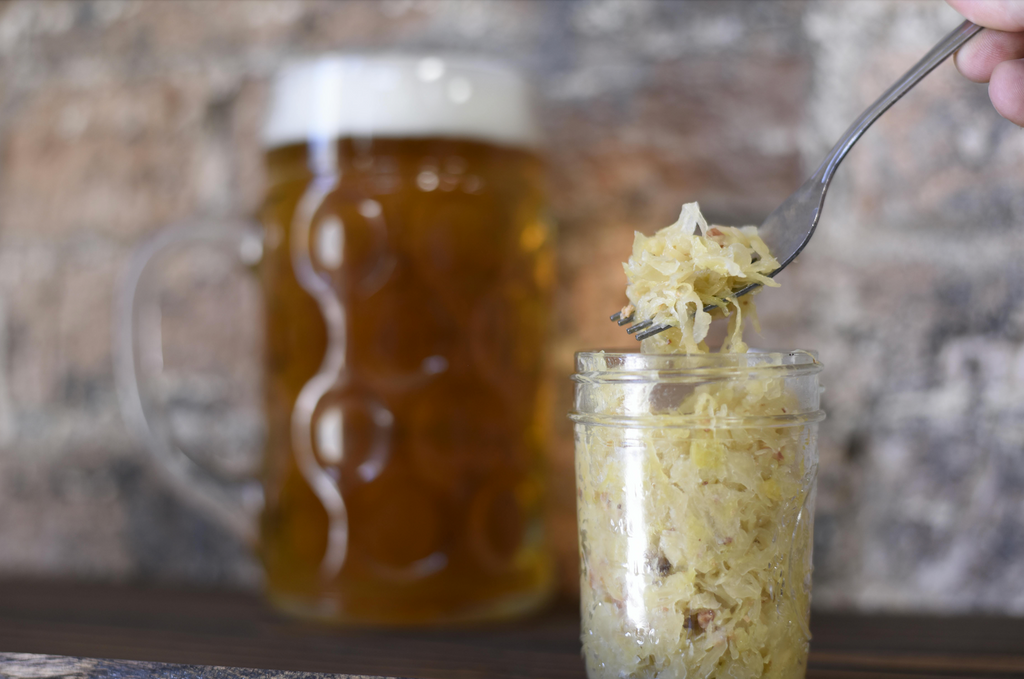Sauerkraut means “sour cabbage” in German and it is this distinct flavour that gives it its famous character. But did you know the tanginess makes sauerkraut superior to other fermented food in other ways? In this article, we’ll look at why the more tangy sauerkraut is better it is for our health.
Believed to have originated in China around 2,000 years ago, it has been embraced by many cultures and societies in the aeons since. It was originally used as a way to preserve cabbage for consumption during the colder weather when it wasn’t easy to grow. Properly fermented, the sauerkraut was able to prevent the brew from spoiling and therefore becoming inedible.
The simplest version is shredded cabbage mixed with salt to draw out water. This causes the fermentation process to begin. While cabbage is very popular, there are many varieties of kraut including the Korean version, kimchi. This is usually spicy and can be made with a number of ingredients including radish, chilli and Korean cabbage.
Why is tangy sauerkraut sour?
It’s the lactic acid that is the key to the tangy taste in sauerkraut and fermented food. Up to a point, the longer vegetables are fermented, the more bacteria multiply, the more carbohydrates are consumed and the more lactic acid is produced. It is the bacteria that proliferate at this stage. These beneficial bacteria populate our gut and are so beneficial to help us digest fibre and absorb vitamins.
However, many companies that sell sauerkraut sell a bland, non-tangy, almost sweetened version. This is because the sweet kraut is fermented for a short time which decreases manufacturing time. By decreasing manufacturing time, non-tangy kraut is cheaper to produce, even though other important benefits are also reduced.
At Gutsy, we believe our sauerkraut and other fermented food has the longest fermentation of any commercially produced product of between two to four weeks. The expert fermenters at Gutsy know well that the time taken to ferment sauerkraut is the secret to its tanginess and associated good health benefits.
But what exactly are the benefits? Let’s take a closer look at why eating properly-fermented sauerkraut is beneficial for our health and wellbeing.
Health benefits of tangy sauerkraut & fermented food
Sailors used to take sauerkraut on voyages when storing fruit for a long time wasn’t practical. Sauerkraut is a rich source of a Vitamin C, making it a great tonic for the immune system and antioxidant. This was ideal to help sailors ward off scurvy on the long voyages around the world.
Kraut, made with cabbage is an excellent source of vitamins and minerals. According to WebMD, one cup of kraut will provide around “35 percent of your daily vitamin C needs, 21 percent of your daily vitamin K needs and 12 percent of your daily iron needs.”
A fuller picture of the nutrients contained in kraut can be found at the US Department of Agriculture website.
The health benefits of eating sauerkraut are many. Science-backed claims include helping to maintain the immune system, boosting brain and heart health and reducing stress levels.
The importance of gut bacteria
In many cases, it is the probiotic effect of the lactobacillus responsible for the fermentation process that helps with these health outcomes. It may help heart health for example, largely because it contains high amounts of fibre and the probiotics.
This is where the sourness of the kraut is so important.
Science continues to link probiotics with good physical and mental health. One area that has become a priority during the current pandemic has been the role it plays in supporting our immune system. As the concluding remarks of this study show, there is still much to learn about this critical area of our health.
“One of the most important systems modified by the microbiota is the immune system and accordingly the microbiota is critical in the response to infection. As we begin to understand the unique interactions of the members of the microbiota with the immune system, the hope is that we will understand how the system is governed.”
So how long should sauerkraut be fermented?
At Gutsy Ferments we believe our kraut is fermented for the longest time of any commercially produced sauerkraut. This is around two to four weeks to bring out the full tanginess and flavour. Our selection of kraut and kimchi is made from organic produce that is sourced locally and fermented in special oak barrels. This makes our kraut (we believe) one of the best and healthiest of all commercially-produced sauerkraut and fermented food available on the market. As mentioned, fermenting for this time allows more lactic acid to develop which is great for our gut health.
The other factor to watch out for in many commercially-produced kraut is whether or not it has been pasteurised. This is a sterilisation process using heat that is designed to destroy bacteria. Unfortunately, pasteurisation doesn’t discriminate. All bacteria are destroyed, including the beneficial gut bacteria.
We believe the addition of a spoonful or two of sauerkraut or kimchi to a balanced diet is a great way to manage your health and fitness. As always, make sure you consult your health professional before making changes to your diet.
At Gutsy, we don’t advocate any diet in particular. Our preference is to suggest a well-balanced diet. Naturally, we believe there is a probiotic advantage to eating these foods. Including sauerkraut and kimchi, along with other gut bacteria-rich foods such as yoghurt, as part of such a diet is very valuable for our health and wellbeing.




